The following College of Education faculty authored, co-authored, or edited books this past year, exploring a variety of topics ranging from how digital tools are used to re-imagine young adult literature to sharing the lived experiences of world language teachers in the U.S. These books were published in the time frame of June 1, 2023 through June 30, 2024.
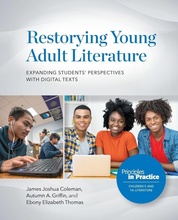
“Restorying Young Adult Literature: Expanding Students' Perspectives with Digital Texts”
James Joshua Coleman (assistant professor of English Education, 2023-24 academic year), Autumn A. Griffin, Ebony Elizabeth Thomas
National Council of Teachers of English (NCTE)
Published June 15, 2023
The digital era presents countless opportunities to read, write, and interpret young adult literature through a contemporary lens. Building upon National Council of Teachers of English’s 2018 “Preparing Teachers with Knowledge of Children’s and Young Adult Literature” position statement, the authors of this book spotlight how teachers and students can use digital tools and technologies to re-read, re-write, and re-story young adult literature today.
The authors propose digital young adult literature and digital young adult culture as conceptual tools from which teachers can learn effective digital re-storying practices. The result is young adult literature instruction that is more engaging and just.
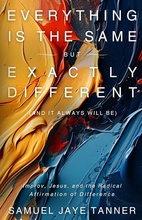
“Everything is the same but exactly different”
Samuel Jaye Tanner (associate professor of English Education)
Quoir
Published June 4, 2024
This is an improvisational book written by an improvisor about the improvisational nature of Jesus, reality, and an improvisational creation. This book is an amalgam of memoir, theology, and improv, and considers how improv and Jesus provoke readers towards eternal affirmations of difference.
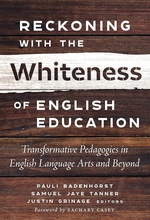
“Reckoning with the whiteness of English education: Transformative”
Edited by Pauli Badenhorst, Samuel Jaye Tanner (associate professor of English Education), Justin Grinage
Teachers College Press
Published Sept. 22, 2023
This volume confronts persistent iterations of whiteness in English education through advancing antiracist dispositions and practices. Readers will find a variety of practical implementations of teaching and learning in English Language Arts, English literacy, and English as a Second Language. Chapter authors are educators who describe various teaching projects located in K–12 and teacher education contexts.
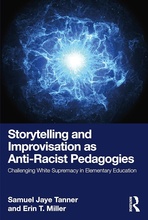
“Storytelling and improvisation as anti-racist pedagogies”
Samuel Jaye Tanner (associate professor of English Education) and Erin T. Miller
Routledge Publishing
Published April 16, 2024
This book theorizes and describes the concept of transformative critical whiteness pedagogies that are rooted in theories and practices of improvisation. It shows how these pedagogies invite people into the urgent work of resisting the ongoing production and affirmation of white supremacy.
Using the frameworks of storytelling and story analysis, this book uses narrative to invite the reader into ongoing work to design and make sense of teaching and learning about whiteness that would meaningfully account for a grapple with white supremacy.
The book uses simple, straightforward language to address complex ideas about anti-racist pedagogies.
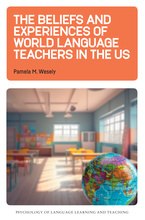
“The Beliefs and Experiences of World Language Teachers in the U.S.”
Pam Wesely (professor of Multilingual Education and associate dean for faculty and academic affairs)
Multilingual Matters
Published May 3, 2024
This book tells the stories of 15 world language teachers in the U.S. at elementary and secondary levels through descriptions of their lived worlds and experiences. In-depth interviews, extensive observations, learner interviews, and document and environment analysis illustrate how teacher beliefs relate to their practices and are mediated and moderated by their learners, institutional demands, equity and access to World Language education and other factors.
